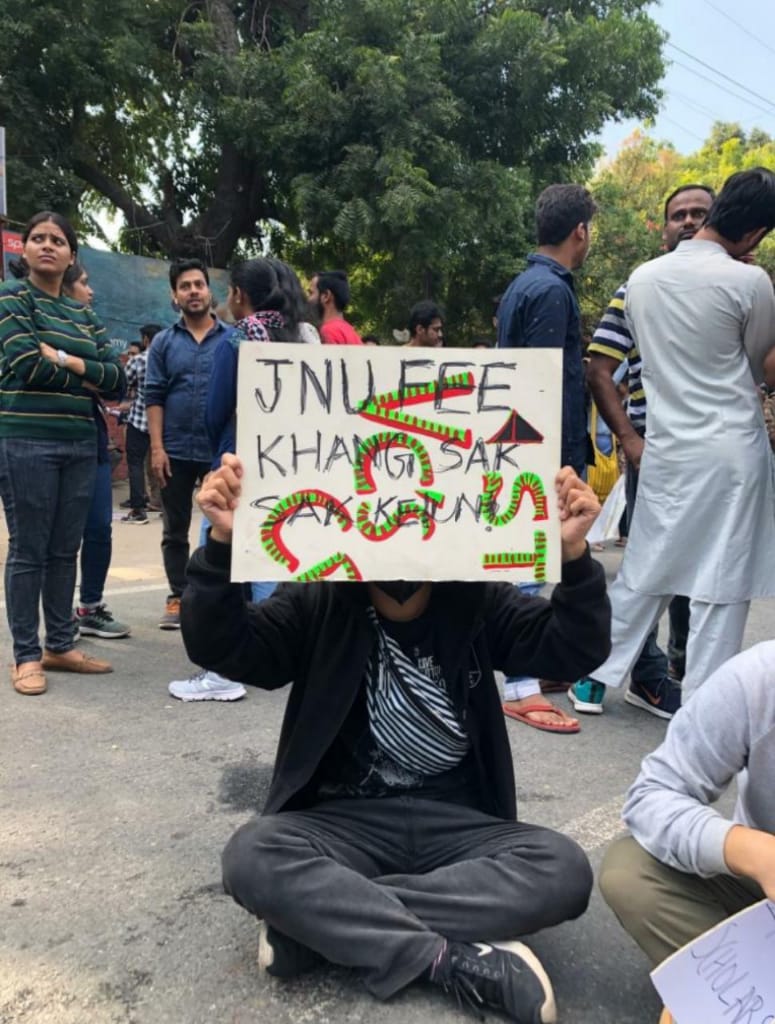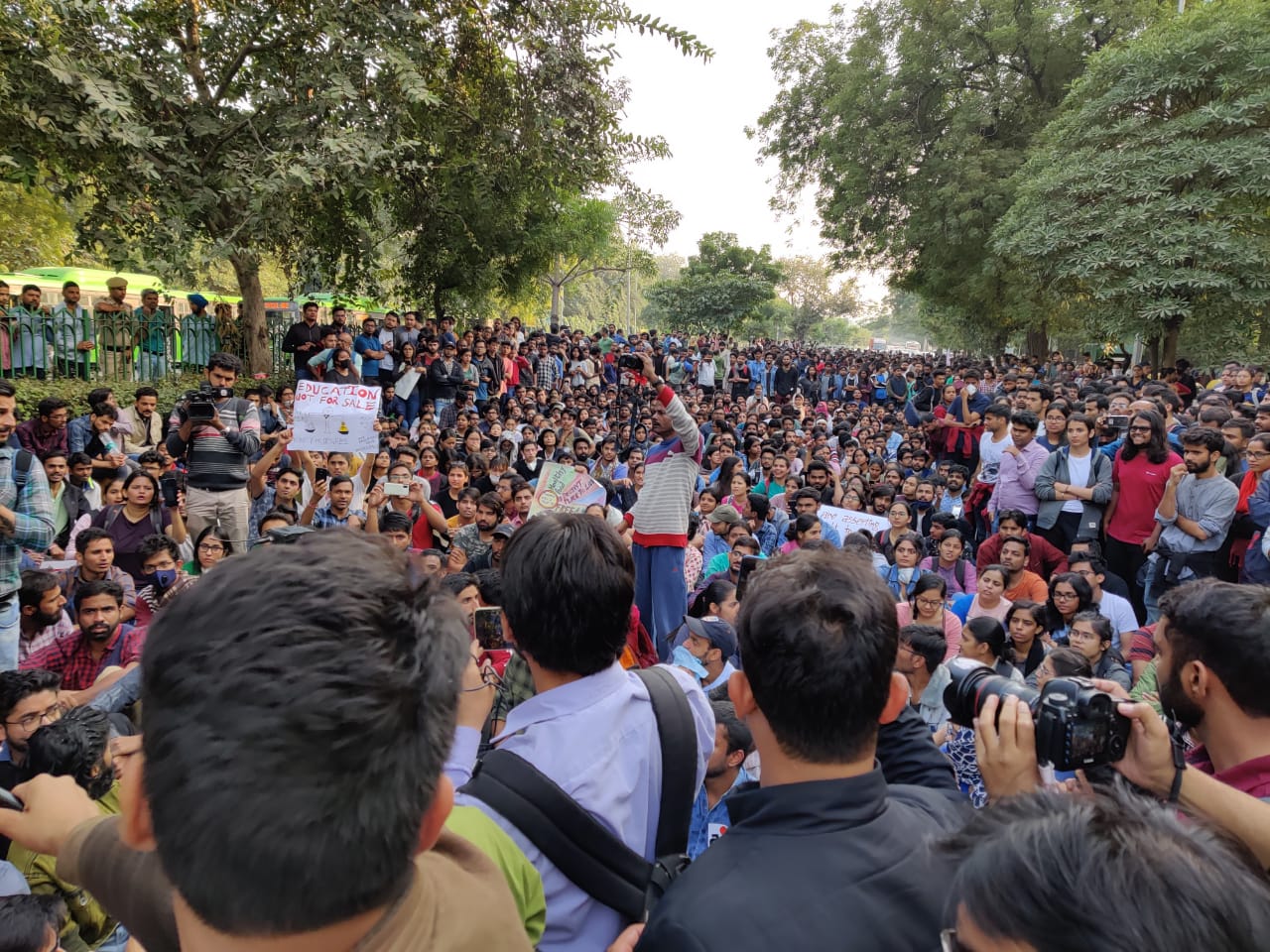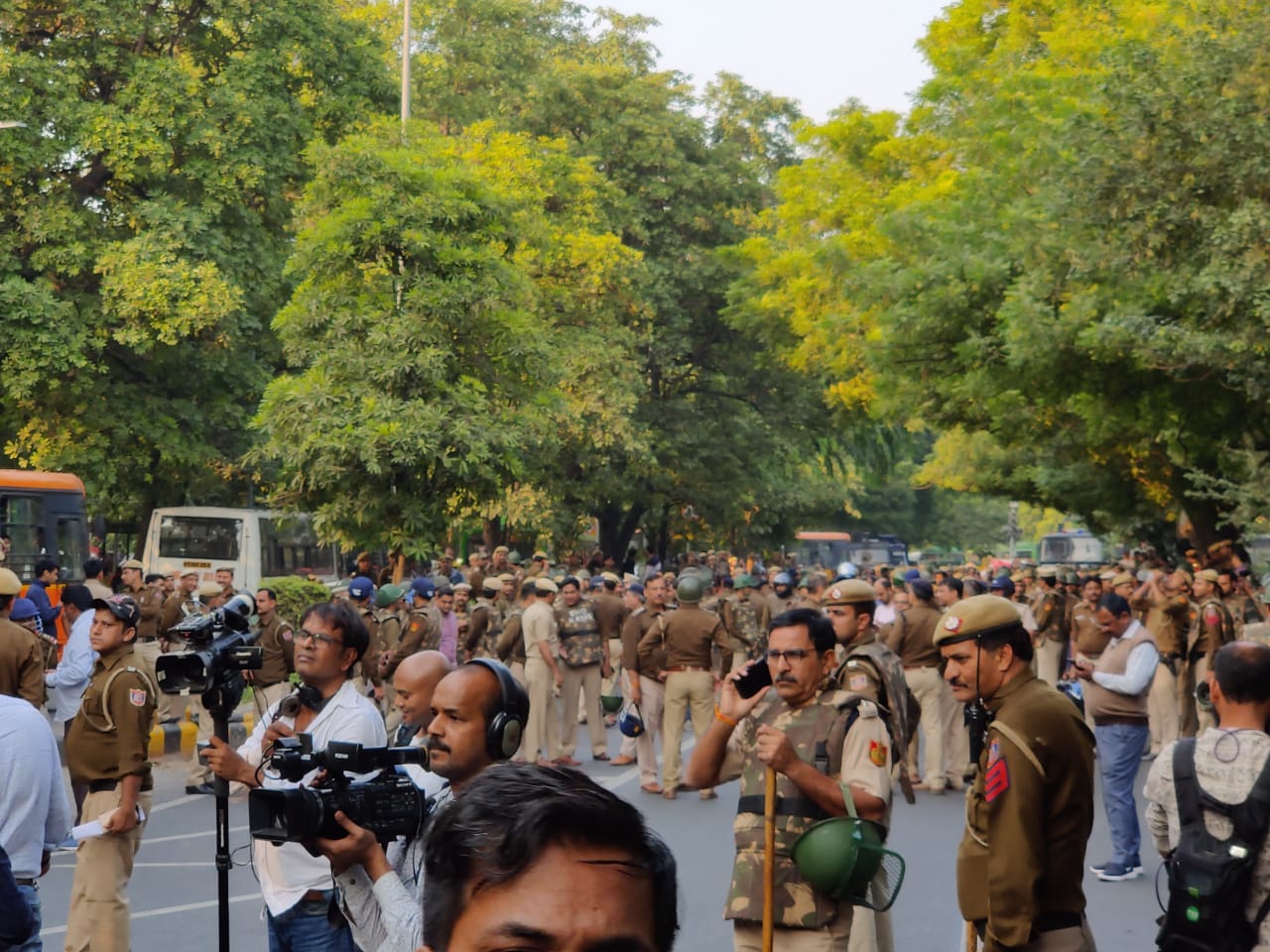The Student Protest in JNU: Education Cannot be the Prerogative of Only the Elites
- Thangkhansuan Gualnam, JNU
The students of Jawaharlal Nehru University are angry. We are frustrated about the administrative negligence and the false narratives spread by the dominant media. Why are we angry, you might ask? This is because the JNU administration felt the need to make ‘tiny’ changes in the Hostel Manual mainly regarding fees, curfew timing, and Dress code. Many people, who are not from the university, are in support of it. However, the students, as well as the professors, are fearful of such changes. The fear is that the new changes to the IHA Hostel Manual will result in the institutional exclusion of a section of poor students that forms more than 40% of the university. In such a context, the only form of resistance available to us is to come out of our campus, protesting on the road, demanding that our voices be heard. And I believe our demands and the actions we’ve taken are fully justified and well-grounded in the constitutional rights guaranteed to us by being part of a democratic India. However, a concerning number of people, failing to see the consequences of a passive acceptance of the new manual, have tagged the Students as disruptive, lazy, politically ill-informed, a nuisance and even anti-national. Some have ridiculed the protest because they believe that there is only an ‘insignificant’ rise in the hostel room rent. While some do that others have even proposed for the complete shutdown of the university all-together. From their privileged position, they have laughed at the over-dramatic reaction of students for a ‘mere’ increase of the room rent from Rs. 10 to Rs. 300 per month.
Why am I stating all of these? Why is there a need to discuss such a faraway issue on a local platform? What can be achieved here by stating what has already been stated so many times? To answer these questions, I would have to give some background explanation which some might feel is too personal. But when the struggle to fight for the personal upliftment of the marginalised (in this case through education) is ridiculed and mocked, then what is personal needs to be made political. Let me further elaborate on this.
Recently, some privileged bureaucrats from within our community have made comments about the above-said issue. According to them, the struggle to fight for the marginalised, for their access to education, and to bring them to the same level playing field is an issue that is “smaller than an ant”. That, because the rich pay lakhs in fees for education the poor should pay the same or accept the dictates of the rich unquestioningly. That because the increase in the JNU school fee, which is subsidised by the government, is less than their phone bill allowance, the poor should not complain but instead be grateful (Emphasis and translations here are mine). It is important to clarify here that there is a huge misconception in these comments. That while the media, for their own convenience and ignorance, headlines the breaking news as an increase from Rs. 10 to Rs. 300 per month, there’s much more to it. The more accurate story is that now, on average the monthly expenditure of students will increase from Rs. 2000-3000/month to Rs. 5000-6000/month. Also, the annual fee would increase from Rs. 27600-Rs.32000/month to Rs. 55000-Rs. 61000/month. Although for some students whose family is economically well-off, these increases in fees might be a small amount in comparison to many of the private universities, and therefore they might be grateful. But one needs to also remember that JNU as a university is composed of students that come from a diverse social background. A large part of the students are from families that can hardly afford the old fees. Among them, there are many who are from our own community. Hence, if we do not protest and rollback many of us will have to pack our bags and leave. Now, although the administration has announced the partial rollback of the Hostel Manual. It is important to keep in mind that there are still students who would not be able to pay 50% of the new fees.
It is here that one needs to remind oneself that ours is a community that is demographically a small tribe, coming from the border of the country, and has for long been structurally marginalised and discriminated. Many of the older generations have had to fight against such marginalisation and discrimination themselves. It is only after a long struggle, which was institutionally supported by different affirmative action and the welfare state that many have now come to occupy important bureaucratic positions. The intent here is not to project the Indian state as a benevolent patron, and glorify it, or that each of us should be uncritically grateful for it. But the intent is rather to show that, while there are many systematic flaws in it, there are also many rightful people who have benefited from it. Now coming from such a social context, it is quite surprising and concerning to hear that some from within our own community mocks and trivialize the issue forgetting to acknowledge such a history of marginalisation. Even more concerning is the ignorance by these elites and powerful people of the continuing structural inequality present within and outside our tribe. Another fundamental problem here is the assumption that because some are now in a privileged position, the rest of the community is as well. It seems that the elites are now oblivious to the deep divide between the rich and poor, and also of the level of inequality persisting between them, within and outside the community. Even more concerning is the fact that they are the ones in power and are the ones framing policies on poverty and social upliftment, while they remain so unaware of the plight of the marginalised.
Another issue here is that, some of them have made comparison between some Ivy League Universities in the west and JNU. Now, although that is quite flattering, there is a complete lack of contextual understanding in such comparison. To them, the achievements of these Ivy League Universities without government subsidies are so glorious that it should be seen as an example to copy-pasted everywhere else, ignoring so many things. But my argument is that, while their achievement needs to be noted, the economic and socio-cultural dynamic of a country like India is so different that copy-paste project might not necessarily be good and need to be aspired for. For one, the GDP of such countries are starkly different and more so, the nature of how these universities came to be established are completely different. The nature of democracy in these are country are also fundamentally different. The leaders of the countries had different goals and method of creating the best way to achieve equality. India, for that matter, believed that because of the structural inequalities persisting in the society, the best way to achieve the set goals is to give each one the same starting point. To do that, government subsidies on education was vital. It was necessary that education be made accessible for all for a fair competition to be even possible.
To conclude I would like to state that, some might see my response as taking it too personally and that such comments are from only a few individuals that should be ignored. But I feel the need to point these comments out and make it personal because these few individuals are not just any individual. They are people that many in our community respect for their achievements, which is rightfully so. Many take their comments as the accurate truth and therefore should be followed unquestioningly. Their influence in shaping the dominant discourse within the community is strong. As such their comments on the above-mentioned issue might also be accepted as justified. Thereby, creating intentionally or unintentionally, the hegemony of the elites within the community. It is therefore pertinent that their comments be addressed and questioned. Otherwise, the consequences will be that education will become the prerogative of the elites and privileged only. Coming from a family of a carpenter, where my family annual income was lesser than the monthly salary of many who ridiculed the protest, it is hard and almost impossible to imagine myself studying in JNU if not for the subsidised fees. Therefore, for the many more aspiring students from the marginalised community across the country and not just from ours, the fight in JNU is indispensable. The fight must go on and the students must win. The New Hostel Manual in JNU has to be rolled back completely.
Lastly, my intention here is not to look for an apology or validation. It is rather to caution that the existing wall of inequality within our community might grow higher, if the issue was not addressed. Through this small piece of essay, a statement needs to be made that certain things in our society, here education, cannot be made exclusive for the rich and privileged alone. That the struggles of the poor and marginalised are no less significant and mockery of it cannot be morally justified in any form.
Thangkhansuan Gualnam
MPhil. 1st semester
Centre for the Study of Social System, School of Social Sciences
Jawaharlal Nehru University, New Delhi
Contact:
Email: This email address is being protected from spambots. You need JavaScript enabled to view it.
Phone: 9711384916




